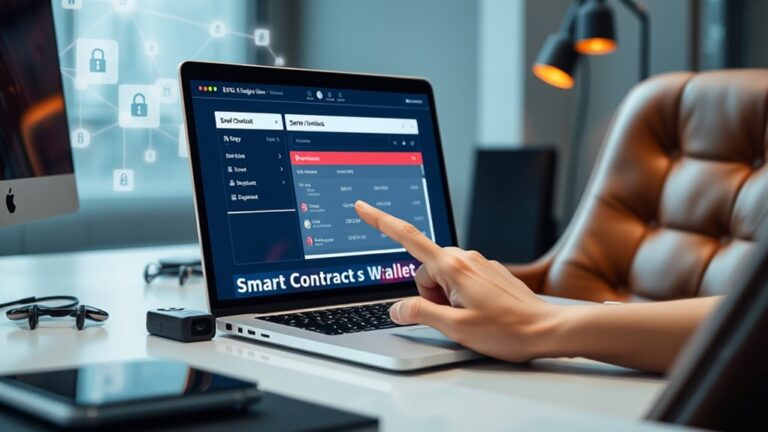
Mobile Wallets Vs Desktop Wallets: Which Is Right for You?
Mobile wallets and desktop wallets each cater to different needs in cryptocurrency management. Mobile wallets offer convenience and portability, allowing quick access to digital assets via smartphones. However, they may face security risks, including phishing attacks. In contrast, desktop wallets provide robust security features and support complex transactions, but require a fixed device. Users should consider their specific interests, such as portability and security preferences, to choose the best option for their cryptocurrency activities. More information follows on how to make this choice.
Key Takeaways
- Mobile wallets offer portability and convenience for everyday transactions, ideal for users who prioritize quick access via smartphones.
- Desktop wallets provide enhanced security features and control over private keys, suitable for those managing larger portfolios or complex transactions.
- Consider your comfort with technology; mobile wallets are user-friendly, while desktop wallets may require more technical understanding for advanced features.
- If you prioritize NFT management, both wallet types now support digital asset diversification, but mobile wallets excel in on-the-go accessibility.
- Evaluate your security needs; desktop wallets generally offer better malware protections, while mobile wallets rely on device security and biometric authentication.
Understanding Mobile Wallets in the Crypto Space

Mobile wallets have become integral to the cryptocurrency landscape, especially as they offer users the ability to manage their digital assets conveniently.
These wallets allow for easy access to cryptocurrencies through mobile devices, making them ideal for everyday transactions. Users appreciate their portability, enabling quick payments via QR codes or NFC technology.
Mobile wallets provide convenient access to cryptocurrencies, perfect for quick, everyday transactions using QR codes or NFC technology.
Security features, such as multi-factor authentication and biometric verification, help protect users from unauthorized access. However, mobile wallets can raise privacy concerns due to potential data collection.
Additionally, since they are often hot wallets, they require an internet connection, which may expose them to hacking risks. Despite these concerns, the non-custodial nature of most mobile wallets allows users to maintain control over their private keys. Implementing strong, unique passwords alongside mobile wallet use can significantly enhance security against unauthorized access.
Exploring the Benefits of Desktop Wallets

Desktop wallets offer a range of benefits that enhance the user experience in managing cryptocurrencies. Primarily, they are non-custodial, giving users full control over their private keys and funds without relying on third-party services.
This autonomy is complemented by the ability to manage multiple cryptocurrencies, allowing for diverse asset portfolios. Desktop wallets also facilitate operational flexibility, enabling direct trading and supporting complex transactions with ease.
Their durability and longevity make them less prone to accidental losses compared to mobile devices. Additionally, some desktop wallets incorporate features akin to hardware wallets, enhancing security by keeping keys offline.
This combination of control, flexibility, and durability makes desktop wallets a compelling option for cryptocurrency enthusiasts seeking effective management solutions.
Security Features: Mobile vs. Desktop Wallets

When considering security features, the differences between mobile and desktop wallets become evident.
Mobile wallets utilize tokenization and encryption to safeguard sensitive data, while biometric authentication offers secure access through fingerprints or facial recognition. However, they face vulnerabilities like phishing attacks and dependency on device security.
In contrast, desktop wallets benefit from robust malware protections and multi-factor authentication, enhancing their overall security. They often employ hardware-based security and full-node capabilities for better control and protection.
Yet, desktop wallets are not immune to risks, including sophisticated malware and the necessity for regular software updates.
Both types require regular audits to address vulnerabilities, highlighting the importance of security awareness for users of either wallet. To further enhance security, users should consider employing strong passwords and two-factor authentication, as these measures significantly reduce unauthorized access risks.
User Experience and Accessibility

User experience and accessibility are essential factors when choosing between mobile and desktop wallets for cryptocurrency management.
Mobile wallets typically offer a streamlined interface optimized for smartphones, making transactions quick and straightforward. In contrast, desktop wallets provide more complex features suitable for users who need detailed control over their assets.
- Mobile wallets allow for instant access and transactions as long as the device is connected to the internet.
- Desktop wallets support multiple operating systems, making them versatile for users with different devices.
- Mobile wallets often integrate with other apps, enhancing usability.
- Both wallet types require internet access, but mobile wallets offer greater flexibility for on-the-go transactions.
- Choosing the right wallet also involves understanding the distinction between custodial and noncustodial wallets, as this impacts user control over their private keys.
Understanding these differences helps users select the right wallet for their needs.
Evaluating Portability and Convenience

Portability and convenience are significant considerations for users evaluating cryptocurrency wallets. Mobile wallets excel in portability, allowing users to manage their assets on the go, as they are accessible via smartphones, which are typically always carried.
This constant accessibility facilitates faster transactions, enhanced by features like NFC and QR code scanning. In contrast, desktop wallets provide a more thorough interface for asset management but require access to a fixed device, making them less portable.
They support various operating systems and offer detailed management for larger holdings. Users with active lifestyles may prefer mobile wallets for their flexibility, while those managing crypto from home might find desktop wallets to be more suitable for in-depth control and organization. Additionally, understanding how crypto wallets store private keys is crucial in selecting the right type for your needs.
Identifying Your Security Needs

How can individuals determine the level of security they need for their cryptocurrency wallets? Understanding personal security needs involves evaluating various factors related to wallet options.
Mobile wallets offer convenience but may be vulnerable to malware and unauthorized access. In contrast, desktop wallets can provide a more controlled environment, but they require proper configuration.
Users should consider the following security aspects:
- Data Encryption: Essential for protecting user data in mobile wallets.
- Multi-factor Authentication: Adds an extra layer of security through biometric or code-based measures.
- Offline Storage: Hardware wallets provide enhanced security by storing assets offline.
- Regular Software Updates: Keeping software current is vital for addressing vulnerabilities. Additionally, users should educate themselves on common threats to better protect their assets.
Future of Digital Wallets in Cryptocurrency

The future of digital wallets in cryptocurrency is expected to be shaped by emerging technologies and changes in the regulatory landscape.
As advancements in security measures, such as biometric authentication, become more common, users may experience enhanced convenience and safety in their transactions. Furthermore, the integration of AI-driven threat detection will likely bolster security, making digital wallets even more resilient against potential attacks. Additionally, evolving regulations could influence how digital wallets operate, potentially leading to greater integration of cryptocurrencies within mainstream financial systems.
Emerging Technologies Impact
Emerging technologies are markedly shaping the future of digital wallets in the cryptocurrency landscape. As these innovations develop, several key trends are becoming apparent, enhancing both security and user experience.
- Enhanced Security Features: Multi-factor authentication and biometric technologies are now standard, improving wallet security.
- Integration with NFTs: Many wallets now support the storage and management of non-fungible tokens, influencing design for digital ownership.
- User Experience Advancements: Modern wallets offer intuitive interfaces, making transactions simpler and more accessible to users.
- Cross-Platform Compatibility: Wallets are increasingly designed to support multiple blockchain platforms, enhancing accessibility and convenience.
These emerging technologies are vital for the evolution of cryptocurrency wallets, ensuring they remain secure, user-friendly, and versatile in a rapidly changing digital environment. Additionally, the rise of wallets like Exodus Wallet highlights the increasing demand for user-friendly interfaces and built-in exchange features in the market.
Regulatory Landscape Changes
As digital wallets continue to gain traction in the cryptocurrency sphere, significant regulatory landscape changes are emerging that will shape their future.
Global cooperation is increasing, as jurisdictions engage in dialogues to harmonize anti-money laundering (AML) and counter-financing terrorism (CFT) regulations. However, countries still display divergent policies, with some embracing cryptocurrencies while others impose strict controls.
In the United States, Congress is working to clarify jurisdictional boundaries between regulatory bodies like the SEC and CFTC. Meanwhile, consumer protection remains a priority, leading to stricter Know Your Customer (KYC) requirements for exchanges and wallets. As regulatory frameworks evolve, the focus on consumer safety and innovation will be crucial in fostering a secure environment for digital wallets.
Despite these efforts, challenges persist, such as unresolved liability issues and the need for ongoing oversight in a rapidly evolving market.
Frequently Asked Questions
Can I Use Both Mobile and Desktop Wallets Simultaneously?
It is possible to use both mobile and desktop wallets simultaneously. This approach allows users to enjoy the convenience of mobile transactions while benefiting from the security and management features offered by desktop wallets.
Which Wallet Is Better for Storing Large Amounts of Cryptocurrency?
In the domain of cryptocurrency, storing large amounts resembles safeguarding treasures in a vault. Desktop wallets, akin to sturdy safes, offer superior security, while mobile wallets, like portable chests, prioritize convenience but expose assets to greater risks.
How Do I Transfer Funds Between Mobile and Desktop Wallets?
Transferring funds between mobile and desktop wallets involves obtaining a unique address from the destination wallet, carefully entering transaction details, and verifying recipient addresses to guarantee successful, secure transfers without irreversible errors.
Are Mobile Wallets Compatible With All Cryptocurrencies?
Ironically, while mobile wallets boast extensive compatibility, they don’t support every cryptocurrency. Users often find themselves traversing a landscape of numerous blockchains, where certain digital assets remain elusive despite the wallets’ multi-chain capabilities.
What Happens if I Lose My Device With a Mobile Wallet?
If a mobile wallet device is lost, unauthorized access may lead to financial loss and identity theft. Implementing security measures like remote wipe, strong passwords, and monitoring services can mitigate these risks effectively.
Conclusion
To sum up, choosing between mobile and desktop wallets depends on individual needs and preferences. For instance, a traveler might find a mobile wallet as essential as a passport, ensuring easy access to funds on the go. Conversely, someone managing larger amounts may prefer the security of a desktop wallet, akin to storing valuables in a safe at home. Ultimately, understanding the strengths and weaknesses of each option will help users make informed decisions that align with their lifestyle and security requirements.














